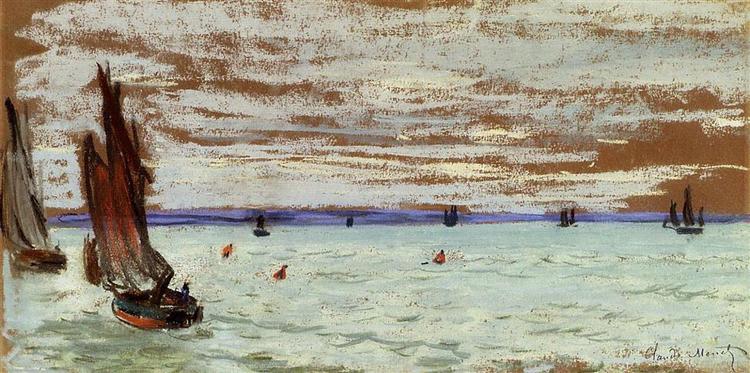Description
The painting "Open Sea" (1866) by Claude Monet is a work that exemplifies the fundamental principles of Impressionism, an artistic movement that Monet helped define throughout his life. In this composition, the viewer is invited to immerse themselves in a vast maritime expanse, where sea, sky, and light intertwine in a dance of color and atmosphere. The work features no human figures or architectural elements, reinforcing the idea that nature and its representation are the central theme. In this landscape, water becomes the main actor, capturing the essence of the ocean at a specific moment in time.
Monet uses a colour palette that, while dominated by blues and greens, is nuanced with subtleties that vary with the natural light. The lighter tones at the top of the work depict a sky in full transformation, which seems to be in tune with the surface of the water below. This relationship between sky and sea results in a visual dialogue that is characteristic of Monet's style. The loose, fluid strokes suggest the movement of water, evoking the feeling of an ever-changing open sea. The rapid, gestural brushstrokes allow the work to convey a sense of immediacy and temporality that are essential to the Impressionist experience.
In addition to the painting technique, it is vital to consider the context in which Monet painted “Open Sea.” During the 1860s, Monet focused on capturing light and the effect of atmosphere in his landscapes, moving away from the more rigid and academic depictions of classical art. This work reflects his innovative approach and desire to capture scenes of everyday life and nature as he perceived them. The lack of human figures is also significant; by stripping the work of elements of personal narrative, Monet allows the viewer to focus on the majesty and beauty of the natural surroundings.
Another interesting aspect is that "Open Sea" was painted during a period when Monet was very influenced by the landscapes of the Normandy coast, where the light and atmosphere have particular characteristics. Monet spent time in these regions, and his familiarity with the sea as a subject translates into a deep understanding of its dynamics and light. This intimate connection with the coastal landscape is perceived in the artist's ability to capture the essence of the open sea in varied weather conditions.
In short, “Open Sea” is a work that encapsulates not only Monet’s mastery as a painter, but also his ability to capture the liveliness and instability of nature. Through his colors and technique, Monet offers a representation of the sea that is both visceral and poetic. The work invites contemplation, reflecting the relationship of the human being with the immensity of the ocean, and leaves the viewer with the feeling of having witnessed a fleeting moment of a sublime landscape. In this painting, as in many of Monet’s works, the experience of art becomes a sensory experience that goes beyond simple visual representation.
KUADROS ©, a famous painting on your wall.
Hand-made oil painting reproductions, with the quality of professional artists and the distinctive seal of KUADROS ©.
Painting reproduction service with satisfaction guarantee. If you are not completely satisfied with the replica of your painting, we will refund 100% of your money.

